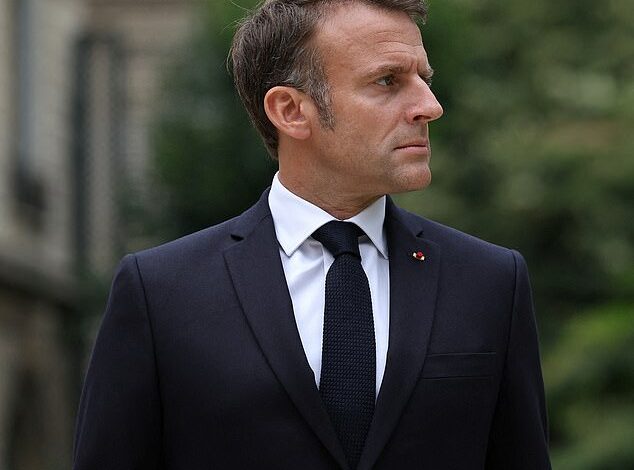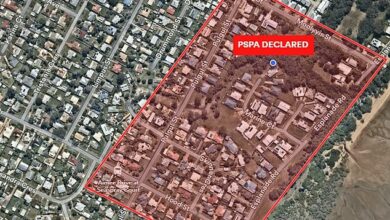The fall of Macron: How France’s president went from de facto EU leader and one of the biggest global figures to the precipice of an election wipeout

Irrespective of the outcome of France’s hotly-anticipated legislative elections this Sunday, Emmanuel Macron is expected to remain the President of France until the end of his term in 2027.
But anyone popping their head into the headquarters of his Renaissance party to test the pre-election mood would think he’s about to go the way of Louis XVI and Marie Antoinette.
That’s because the ‘Together’ alliance – a coalition of centrists led by Macron’s party – is set to be slaughtered when the French electorate heads to the polls tomorrow.
The only real question is whether Macron’s rival Marine Le Pen and her hard-right National Rally (RN) will be able to win the election so convincingly as to emerge with a majority.
Latest exit polls are split over whether France faces a hung parliament or an outright RN victory – but if it’s the latter then Macron will effectively lose control of his government.
He’ll be forced to replace his mini-me prime minister Gabriel Attal with Le Pen’s 28-year-old hotshot Jordan Bardella, and although he would retain the lead on France’s foreign policy, domestic politics would largely be steered by the RN.
Such a scenario would leave an indelible mark on the legacy of Macron, who would be destined to spend the last three years of his presidency watching the RN undo his work and reshape France according to Le Pen.
Here, MailOnline breaks examines why Macron and his party fell from grace and delves into some of the key issues fuelling the hard-right fervour ahead of Sunday’s parliamentary elections.

Anyone popping their head into the headquarters of Macron’s Renaissance party headquarters to test the pre-election mood would think he’s about to go the way of Louis XVI and Marie Antoinette

La Rotonde restaurant – one of Macron’s favourite Parisian establishments – burns after being attacked by protesters after the government pushed a pensions reform through parliament without a vote, using the article 49.3 of the constitution, in Paris on April 6, 2023

Protestors light a fire with electric bikes in front of the Hotel de Ville during a demonstration after France’s Constitutional Council approved the key elements of French President’s pension reform, in Paris on April 14, 2023

Marine Le Pen and RN Mayor of Perpignan Louis Aliot leave the party’s headquarters in Paris on July 2, 2024

Leader of the French hard-right National Rally Marine Le Pen, left, and lead candidate of the party for the upcoming European election Jordan Bardella during a political meeting on June 2, 2024 in Paris

Emmanuel Macron is staring down a French parliamentary election defeat as his centrist allies squabble with hard-left candidates over how to prevent Marine Le Pen’s National Rally party from winning an absolute majority
Since his entry into France’s Elysée Palace in 2017, Macron has billed himself as the ultimate statesman – a quick-witted, slick-talking diplomat with a fierce political nous and a dab hand at economics thanks to a background in banking.
When Angela Merkel finally left office after a marathon 16-year reign as German Chancellor in 2021, he picked up the baton as the most influential leader in Europe and is now seen by many as the consummate European politician.
The French President’s impressive approval ratings across the continent are a testament to his status as a talisman of Europeanism.
An Ipsos poll in March 2024 ranked him as the second most popular European leader behind Ukrainian President Volodymyr Zelensky – who, it must be said, has a rather unfair advantage.
But his detractors claim he’s focused on building his rep in Europe at the expense of his own voters at home – and the results of recent votes appear to validate that criticism.
Macron’s party was battered in European parliament elections last month – the catalyst behind his decision last month to call a snap election in France.
Meanwhile, the first round of the legislative elections last week saw Le Pen and Bardella’s National Rally (RN) win some 33% of the vote ahead of a left-wing alliance on 28% – with Macron’s centrists languishing in a distant third on just 20%.
The reasons for Macron’s unpopularity are numerous, but there appear to be four key issues that have turned the French electorate against his centrist party.
Immigration and extremism
The National Front is largely seen as a ‘far-right party’ at home and abroad – but its own members are loath to refer to themselves as such.
RN members see themselves as ‘nationalists’ and ‘localists’ who hold the interests of the French people above all others.
This, of course, means cracking down on immigration – something which has grown consistently in France for decades.
According to statistics office INSEE, immigrants constituted 5% of the population in 1946. This figure increased 3.5 percentage points to 8.5% in 2010.
But net migration has soared since then and jumped even higher after Macron came to power in 2017. Now more than 10% of the French population is made up of immigrants.
Meanwhile, Macron’s presidency has seen a litany of shockingly violent attacks authored by Islamic extremists.
The murder and beheading of history teacher Samuel Paty in 2020 by a Chechen Muslim refugee sparked national outrage, but many more attacks have happened since then.
Late last year, another French schoolteacher was stabbed to death and several others injured by an Islamist knifeman in Arras, and a German tourist was killed by a 26-year-old man who had previously been sentenced to a four-year prison sentence for planning to join the Islamic State in Syria.
For his part, Macron is cognizant of both issues. In October last year he gave an impassioned speech condemning violent extremism, days after a French schoolteacher was stabbed to death by a 20-year-old Islamist.
And in December his government passed a bill that made it harder for migrants to access state benefits that at the time was lauded by Le Pen as an ‘ideological victory’ for the RN.
Non-EU citizens working in France now have to prove they have been in the country for 30 months before they can receive welfare benefits such as child care. Meanwhile, unemployed immigrants must wait five years before they can get benefits – a massive increase versus the previous stipulation of just six months.
But these measures are seemingly too little, too late, with the RN promising a much tougher stance on immigration.

French President Emmanuel Macron leaves after paying his respects by the coffin of Samuel Paty in the courtyard of the Sorbonne university during a national memorial event, October 2020

Crowds gathered at Place de la Sorbonne to watch the National Tribute to the murdered school teacher Samuel Paty led by French president Emmanuel Macron on October 21, 2020 in Paris

A photograph of history and geography teacher Samuel Paty as seen at his tribute ceremony in Eragny-sur-Oise, northwestern Paris


Mohammed Mogouchkov, a 20-year-old Chechen refugee, stabbed a French schoolteacher to death and injured two other people in a knife attack at a school in Arras in northern Francelast year
Bardella himself has declared he will wage a ‘cultural battle’ against Islam if his party emerges victorious from parliamentary elections.
If he is made Prime Minister in the case of an RN absolute majority, the party will seek to pass legislation to ‘combat Islamist ideologies’ in France that would grant the government enhanced powers to shutter mosques and deport imams suspected of being associated with extremist ideologies.
Besides the commitment to reduce the influence of Islam in France, another RN proposal being pushed by Bardella would see the abolition of free health care for foreigners and the ‘droit du sol’ law which affords anyone born on French soil the right to citizenship.
Himself the son of Italian immigrants, he said a far-right government would install a ‘national preference’, putting foreigners at the back of the queue for welfare benefits.
The RN candidate also declared he would prevent dual citizens from accessing certain ‘strategic’ state jobs – a measure that was dismissed by Macron’s Prime Minister, Gabriel Attal, as xenophobic.
‘The message you are sending is that when we are dual citizens, we are half-citizens, we are not real French people,’ Attal said last week, adding that he suspected the real targets of the RN proposal were not people with high-level positions, but everyday dual citizens.
Economic woes
France has in recent years grappled with a spiralling cost of living and soaring inflation.
This can hardly be attributed exclusively to Macron – the fallout of the Covid pandemic, the Russian invasion of Ukraine and the resulting energy crisis as Europe sought to decouple from Russian gas supplies compounded to punish the economies of most European countries.
But France, despite being one of the EU’s largest and most powerful members, is also flouting the bloc’s own regulations on debt and budget deficits.
The EU stipulates that its members must not exceed a budget deficit of 3% of GDP – and those that do must formulate a raft of policies designed to ruthlessly cut borrowing and spending until the European Commission decides their deficit has returned to acceptable levels.
Public debt meanwhile must be held within 60% of GDP.
But under Macron, France ran up a budget deficit of 5.5% of GDP last year – and the nation’s debt now sits at well over €3 trillion. In December 2023, the public debt was put at 110.6% of GDP according to CEIC data.
And Macron faced one of the darkest moments of his presidency last year when he used special powers to force wildly unpopular pension reforms through parliament without a vote.
Under the reforms, France’s retirement age will gradually rise from 62 to 64, with the age increased by three months each year starting from this September until 2030. From 2027, most workers will also have to make social security contributions over 43 years rather than 42 years in order to draw a full pension.
The move prompted widespread riots that endured for weeks. Tens of thousands of workers flooded the streets in a violent expression of their outrage, lighting garbage on fire, smashing up properties – including Macron’s favourite Parisian restaurant – and refusing to work.
Macron’s first presidential term was also blighted by the Yellow Vest protests – months of demonstrations by working- and middle-class citizens enraged by fuel tax increases, among other policies.

RN leader Marine Le Pen reacts as she meets supporters and journalists after the release of projections based on the actual vote count in select constituencies, Sunday, June 30, 2024 in Henin-Beaumont, northern France

A photograph shows the frontage of a police station on fire during a demonstration, after France’s Constitutional Council approved the key elements of French President’s pension reform, in Rennes, western France, on April 14, 2023

A protester throws a tear gas canister during clashes with police during a demonstration after France’s Constitutional Council approved the key elements of a pension reform, in Nantes, western France, on April 14, 2023

French National Rally party President Jordan Bardella poses prior to a debate broadcasted on French TV channel TF1
In an attempt to assuage the French people’s concerns over the economy Prime Minister Gabriel Attal last week declared the government would lower energy bills, soften inheritance tax and link pensions to inflation to ease the strain on household finances if the Macron alliance remains in power after July 7.
‘There will be no tax hikes, no matter what,’ he said.
But the RN has doubled down on a populist agenda that prioritises public finances.
Bardella, who has presented himself as a potential ‘purchasing power prime minister’, launched last week’s pre-election debate by producing a picture of an electricity bill he said was making millions of people anxious.
He said he would bring in dramatic cuts in VAT and fuel prices, and attacked Attal, claiming the centrist Prime Minister had zero credibility on public finances.
‘I’m hearing you, Mr Attal, lecturing us on budget discipline, despite the fact you now have the biggest debt in the euro zone and you have created a public deficit of 5.4%,’ he said, adding France was now in a state of ‘near bankruptcy’.
Meanwhile, the RN’s leading finance expert, Jean-Philippe Tanguy, has pledged to end the trend of ‘letting the deficit run out of control’.
‘We won’t use any wiggle room, which France no longer has, and we will break with 50 years of systematically running deficits,’ he said, claiming the RN’s economic programme would be entirely financed by closing tax loopholes, reducing red tape, and spending cuts – especially on welfare for immigrants as part of the crackdown on immigration.
Bardella has also declared the RN would demand a huge cut of between €2 billion and €3 billion in France’s contributions to Europe.
But politicians across the political spectrum have decried the RN’s economic policies as impossible to execute.
National Rally ‘cleanup’
The rise of the RN in recent years is attributable in no small part to its leader Marine Le Pen, who has worked tirelessly to rehabilitate the image of a party that for decades was seen as an untenable prospect.
The party was founded as the ‘National Front’ in 1972 by Marine’s father Jean-Marie Le Pen along with Pierre Bousquet, who was a member of a Nazi Waffen-SS division formed of French collaborators.
As such, the National Front quickly became synonymous with far-right extremism in France, advocating for ruthless immigration controls and a host of other nationalist policies.
Jean-Marie Le Pen himself was a hardliner notorious for provocative statements and polarising soundbites – including Holocaust denial and overtly racist comments – which cemented the party’s reputation on the fringes of French politics.
But Jean-Marie resigned in 2011 and gave way to his daughter Marine, who embarked on a decade-long campaign to reshape the party and make it more appealing to the French electorate.

Le Pen shakes hands with President Emmanuel Macron after talks at the presidential Elysee Palace, in Paris, on June 21, 2022

Marine Le Pen, member of parliament and French far-right National Rally (Rassemblement National – RN) party leader, arrives at the RN party headquarters in Paris, France, July 1, 2024

French far-right National Front (FN) founder Jean-Marie Le Pen was expelled from the party by his own daughter in 2015

FILE PHOTO: French far-right party Front national (FN) President and candidate for the 2012 French presidential election, Marine Le Pen (R) is greeted by her father, FN honorary president, Jean-Marie Le Pen at the end of a campaign meeting on March 30, 2012 in Nice, southeastern France
Under her watch, the National Front climbed down from some of its extreme-right positions and Le Pen herself went out of her way to criticise anti-Semitism in France in an attempt to break with the party’s reputation as Holocaust deniers.
Her commitment to the path was affirmed in 2015 when she expelled her father – who was serving as honorary president – from the party he founded after he reiterated Holocaust denial comments.
Then in 2018 she oversaw a total rebrand of the party, doing away with the ‘National Front’ in favour of its contemporary name, the National Rally.
She has run for president three times in 2012, 2017 and 2022, and has lost out each time – twice to arch-rival Macron.
But each time the National Rally, as it is now known, has increased in size and strength, and is now poised for unprecedented success.
Irrespective of one’s view on Marine Le Pen’s politics, the RN’s historic success in the first round of parliamentary elections on Sunday is undoubtedly a mark both of her political resilience and skilful repositioning of the party.
Disdain for Macron
Concerns over immigration and extremism, the state of the economy and the rehabilitation of the RN’s image have all hastened the tilt of the French public to the right.
But the author of this article would be remiss were he not to point out that, at the end of the day, most French people simply do not like their president anymore.
A week before Sunday’s first round elections, Macron’s approval rating was mired at just 26% – a historic low equal only to the weeks following the introduction of his detested pension reforms.
Macron’s party is fully aware of the nation’s perception of their leader.
His face has been removed from election posters and flyers being touted by MPs from his party, who have implored him to allow his prime minister Gabriel Attal to take the lead in running the legislative campaign.
Macron himself had said last month that Attal would be responsible for directing much of his Renaissance party’s campaign.
Yet he still appears ubiquitous, giving regular speeches, interviews and even appearing on podcasts.

Incumbent president Emmanuel Macron’s centrist alliance languishing in a distant third on just 20% of the first round vote

Emmanuel Macron’s official photographer releases pictures of the French President in a boxing gym in March 2024

Much of the French electorate sees the president as pig-headed and arrogant – a man who is convinced he knows best and simply cannot satiate his lust for the limelight
Earlier in his presidency, this self-confident, almost braggadocios showmanship marked Macron out as a well-rounded and highly capable leader.
But now, many French voters see their president as pig-headed and arrogant – a man who is convinced he knows best and simply cannot satiate his lust for the limelight.
Macron’s decision to call snap elections after his party suffered a heavy defeat to the RN at last month’s European parliamentary elections seems to have been the final nail in the coffin.
He said in the wake of the defeat that he was listening to the electorate, declaring that he called the elections ‘because there is nothing greater and fairer in a democracy than trust in the people.’
But subsequent comments made by Macron, in which he said a far-right or far-left victory in the elections could lead to ‘civil war’, saw him lambasted for stoking fear among voters and trying to paint himself and his party as the only stable choice, with the alternative being chaos.




